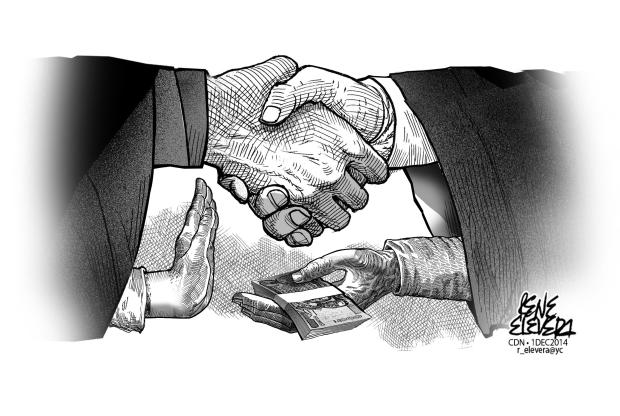There’s something to feel good about the 2013 National Household Survey on Experience with Corruption in the Philippines. It showed that fewer Filipino families give bribes or grease money to government officials.
According to a Philippine Daily Inquirer report, the survey polled 10,864 respondent-families that represented 21.9 million families nationwide and was a rider to the 2013 Annual Poverty Indicators Survey conducted by the Philippine Statistics Authority.
The survey showed that due to fewer families agreeing to give bribes, corrupt government officials take the lead in soliciting grease money. Among those who solicit the most were law enforcers, prosecutors and court officials.
If ever there were bribes given by the families, these usually go to expediting the delivery of social services like education, health care, employment, livelihood and subsidies.
Another interesting fact: One out of 20 admitted to giving bribes at the behest of government officials, or five percent lower than the 2010 survey which showed that two out of 20 or 10 percent gave bribes after being solicited by government officials.
The three-year reduction doesn’t exactly represent a dramatic sea change in bureaucratic government culture. But it does set a marked change in the attitude of Filipinos towards corruption: They’re growing more intolerant about its practice.
Gone are the days when Pinoys would simply accommodate the continued “tulisitations” of corrupt government officials who either demand it outright, make under the table arrangements or give the “silent treatment” – that is, they enumerate the many reasons why a family can’t receive some documentary requirements or service and let it trail off, until the families realize that they are asking for bribes.
Aside from the Aquino administration’s continued campaign against corruption, both traditional and social media share credit for slowly but surely initiating the change in mindset over the presence of corruption and abuse in government.
From a simple “Thank You” post by one female model to a top police official that drew complaints from ordinary Facebook users, to the anti-pork barrel online rants posted by concerned citizens that snowball into nationwide rallies and signature campaigns, the fight against corruption has taken on another, more pervasive level.
And this willingness to speak out, to “shout out” in either social or traditional media should be encouraged even with the limits posted by libel laws.
A vigilant Filipino citizenry is critical to exposing, humiliating and ferreting out these abusive public officials and others who abuse their positions and privileges to bleed the country’s coffers dry.
